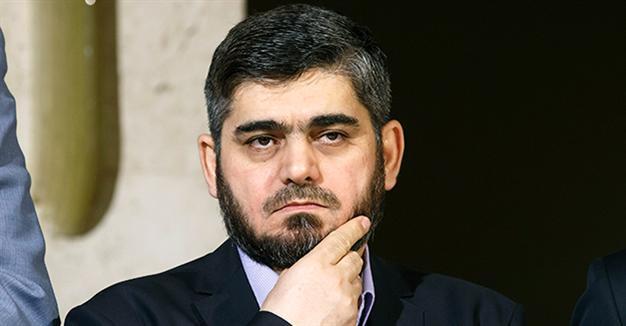Syrian opposition asks UN to halt peace talks
BEIRUT/GENEVA – Reuters

Mohammed Alloush, chief negotiator for the main Syrian opposition body and rebel group Army of Islam, listens during a briefing after a round of negotiation between the Syrian opposition and the UN Special Envoy of the Secretary-General for Syria Staffan de Mistura at the European headquarters of the United Nations in Geneva, Switzerland, Friday, April 15, 2016 - AP photo
The mainstream Syrian opposition asked the United Nations to halt peace talks on April 18 and rebel groups launched a new offensive against government forces, accusing the world body of bias in favor of Syrian President Bashar al-Assad.
The opposition’s coordinator at the Geneva talks, Riad Hijab, said earlier it was unacceptable for talks to go on if the government and its allies pushed on with sieges and bombing civilian areas, echoing recent criticism of government offensives elsewhere.
Only three delegates met U.N. envoy Staffan de Mistura for talks on April 18, instead of the usual 15, after a letter signed by unspecified “armed revolutionary factions” said de Mistura and the government were trying to put forward “half-solutions.”
“We asked for the postponement of talks, only a postponement until the conditions are right for a resumption of negotiations,” Mohammad al Aboud, a member of the negotiating team, told Reuters.
Both sides have accused one another of breaking a Feb. 27 partial truce deal, which does not include the Islamic State of Iraq and the Levant (ISIL) or al-Qaeda’s Syrian affiliate the Nusra Front and which began to unravel as fighting escalated near Syria’s second city Aleppo this month.
The cessation of hostilities was meant to provide a breathing space for talks to end the conflict via a political transition for Syria but a second round that began last week has made little headway.
On April 18, rebels launched a fierce attack against government forces in the Latakia province, which lies on the Mediterranean coast, and made separate advances further east in Hama, while there were heavy government air strikes in the Homs province to the south.
Rebel groups early in the day announced a new battle against the government and its allies which they said was in response to ceasefire violations.
“After the increase of violations by regime forces that included targeting displaced people and continuous bombing of residential neighborhoods, we declare the start of the battle in response,” said a statement signed by 10 armed rebel groups, AFP reported.
The Latakia and Hama assaults appeared to be that battle, with some of the groups that made the announcement involved in the fighting, the Syrian Observatory for Human Rights monitoring group said. A Syrian military source confirmed intense fighting in the area.
“Today they attacked in the northern Latakia countryside in several areas, in violation of the cessation of hostilities agreement, and also in the northwestern Hama countryside,” the military source said.
The Observatory reported that in northern Homs province heavy government air strikes killed four people, and said the death toll was expected to rise, with more people wounded.
Mohamad al-Shamsi, a doctor in the Homs area, told Reuters there had been at least 10 air raids from early morning on Rastan and nearby Deir Foul and al-Houla. Schools had been evacuated and hospitals shut.
On April 18, the chief Syrian government negotiator Bashar Ja’afari told reporters he had exchanged ideas with de Mistura on “important issues” but did not take questions or make any mention of a political transition.
“The transitional government will be a difficult task for both the government and the opposition parties,” Chinese special envoy Xie Xiaoyan told reporters after meeting de Mistura. “But that doesn’t mean they should ... leave the discussion and go back to the battleground.”
